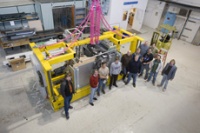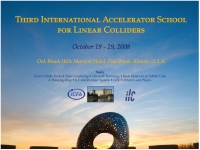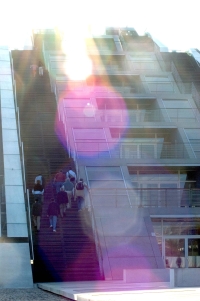From Fermilab Today: Fermilab welcomes CALICE to Test Beam facility

Members of the CALICE collaboration and Fermilab scientists take a break from installing the experiment in the Meson Test Beam Facility at Fermilab. |
One of Fermilab's most distinct buildings now has a new resident. Last month, members of the CALICE collaboration moved their calorimeters into the newly renovated Meson Test Beam Facility. They will test the calorimeters with low- and high-energy particle beams during the next two years.
Read more...
-- Rhianna Wisniewski |
 |
|
|
 |
Upcoming meetings, conferences, workshops
LoopFest VII
Radiative Corrections for the LHC and ILC
University at Buffalo, Amherst, New York, USA
14-16 May 2008
ICFA NANOBEAM Workshop
Budker INP, Novosibirsk, Russia
25-30 May 2008
XXII Symposium on Photonics and Electronics for Accelerators and High Energy Physics Experiments
Warsaw University of Technology Resort, WILGA
26 May - 1 June 2008
 GDE Meeting - ILC Conventional Facilities and Siting Workshop GDE Meeting - ILC Conventional Facilities and Siting Workshop
JINR, Dubna, Russia
3-7 June 2008
International Linear Collider ECFA Workshop (ECFA 2008)
Warsaw, Poland
9-12 June 2008
Polarized Positron for Linear Colliders Workshop (Posipol 2008)
Hiroshima University, Japan
16-18 June 2008
European Particle Accelerator Conference (EPAC'08)
Genoa, Italy
23-27 June 2008
Upcoming schools
Terascale Monte Carlo School
DESY, Hamburg, Germany
21-24 April 2008
The second Trans-European School for High Energy Physics (TES-HEP)
Buymerhovka, Sumy region, Ukraine
3-9 July 2008
Third International Accelerator School for Linear Colliders (2008 LC School)
Oak Brook, Illinois, USA
19-29 October 2008
|
|
 = Collaboration-wide Meetings = Collaboration-wide Meetings
GDE Meetings calendar
View complete ILC calendar
|
|
|
 |
Spin doctors
Polarisation and polarimetry experts meet for the first time

The polarimeter prototype in the test beam at DESY. |
Theorists and experimentalists aren't always of the same opinion. There is one thing on which opinions aren't polarised though, and that is polarisation. Polarisation is a special characteristic of a particle bunch – a sort of measure of the particles’ combined spin – that, when studied in the right sort of detector at the ILC, is supposed to give clues and answers on phenomena like the Higgs, supersymmetry or searches for new physics and extra dimensions. To study the collisions, and also to understand polarisation better, a few groups of a total of about 30 people around the world are designing and building polarimeters that measure the degree of polarisation of the particles before and after collisions. They have just had their first 'collaboration' meeting at DESY in Zeuthen, near Berlin, Germany.
Read more...
-- Barbara Warmbein |
 |
|
|
 |
From Tagesspiegel
8 May 2008
Die Urknallmaschine
...In dem zukünftigen "International Linear Collider" sollen auf einer 31 Kilometer langen Geraden Elektronen und ihre Antiteilchen, Positronen, aufeinander- knallen. Wozu? Nun ja, um einen etwas präziseren Blick auf das zu werfen, was der LHC so ans Licht bringen wird.
Read more... |
|
From New Scientist
7 May 2008
Editorial: How to wreck a nation's scientific credibility
...The committee identifies other worrying trends in political attitudes to science.
Read more... |
|
From Chicago Business
6 May 2008
Women to Watch '08: The Collider Queen
Watch video |
|
From SLAC Today
5 May 2008
Helping to Power the Future
SLAC made a key contribution to the next generation of linear accelerators this month with the delivery of 38 innovative power supplies to KEK in Japan.
Read more... |
|
From nature
2 May 2008
Column: Of myths and men
Worries about an apocalypse unleashed by particle accelerators are not new, says Philip Ball. They have their source in old myths, which are hard to dispel.
Read more... |
|
From The Engineer
30 April 2008
Comment: Facing the Black Hole
It’s also damaged the UK's involvement in some of the most ambitious major research, including the plans for the giant International Linear Collider to investigate phenomena that even CERN won’t be able to observe.
Read more... |
|
|
 |
 |
|
|
 |
Third International Accelerator School for Linear Colliders: apply now

The Third International Accelerator School for Linear Colliders will take place in Oak Brook, Illinois. |
Recruiting and training the next generation of accelerator physicists is crucial to the future of the field. Accelerator schools play a central role in introducing potential accelerator experts to the science and in providing advanced education. Since the ILC has many very talented accelerator physicists working on some of the most challenging problems in accelerator physics, it is natural for us to sponsor and organise the schools that have themes that are close to our own research. The Global Design Effort has given priority to sponsoring and providing lecturers for two very successful schools, and we are now preparing for our "Third International Accelerator School for Linear Colliders," which will be held in Oak Brook, Illinois from 19-29 October 2008. The deadline for applications is 15 May. We encourage all interested and qualified students to apply for what I am confident will be a very rewarding experience.
Read more...
-- Barry Barish
Director's Corner Archive |
 |
|
|
 |
Stepping up to cost management

Some ten people from the ILC management, including the RDR's cost engineers, are meeting at DESY in Hamburg at the moment to define a costing strategy for the project's next phase. Their main task: getting on top of things like cost drivers and excel technicalities (and some buildings in Hamburg harbour). Read about the results of the meeting in a future NewsLine issue.
|
Back to school
Don't forget that the registration deadline for the Third International Accelerator School for Linear Colliders (19-29 October in the Oak Brook Hills Marriott Hotel, Oak Brook, Illinois, USA) is 15 May! More info
|
|

